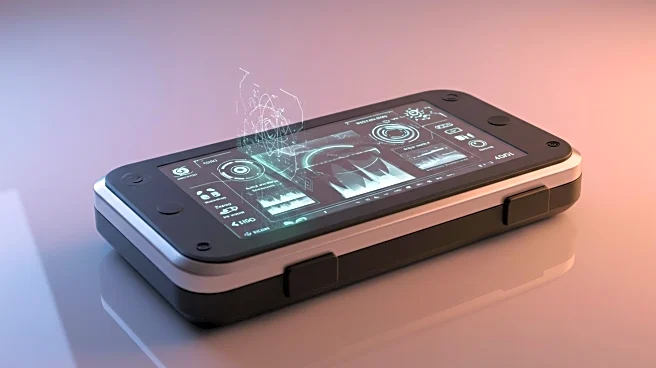What is the story about?
What's Happening?
Abxylute, known for its streaming handheld devices, is set to release the world's first glasses-free 3D handheld PC, named the Abxylute 3D One. This device is based on a prototype co-developed by Intel and Tencent, showcased at CES earlier this year. The Abxylute 3D One utilizes eye-tracking technology to deliver its 3D effects, distinguishing it from the Nintendo 3DS, which used parallax barrier technology. Priced at under $1,700, the device features an Intel Lunar Lake chip, 32GB of LPDDR5X RAM, and a 120Hz display. It is optimized to play 50 of the top games on Steam in 3D. The company is promoting the device using images of Super Mario Odyssey and Fire Emblem: Awakening, games exclusive to Nintendo hardware, hinting at the device's emulation capabilities. The Abxylute 3D One is scheduled for release in late September.
Why It's Important?
The introduction of the Abxylute 3D One marks a significant advancement in gaming technology, offering a new way to experience games without the need for 3D glasses. This could potentially shift consumer expectations and drive innovation in the gaming industry. The device's ability to emulate Nintendo games may also stir discussions on intellectual property rights and the legality of emulation. For gamers, this offers a unique opportunity to experience popular titles in a new format, potentially increasing demand for similar technologies. The high price point suggests it is targeted at enthusiasts and early adopters, which could influence market dynamics and competitive strategies among gaming hardware manufacturers.
What's Next?
As the Abxylute 3D One approaches its release date, industry observers will be watching for consumer reactions and sales performance. The device's emulation capabilities may attract scrutiny from Nintendo regarding intellectual property rights. Additionally, other gaming hardware companies may respond by developing their own glasses-free 3D technologies or enhancing existing products to compete. The success of the Abxylute 3D One could lead to broader adoption of eye-tracking technology in gaming devices, potentially influencing future product designs and gaming experiences.
Beyond the Headlines
The use of eye-tracking technology in the Abxylute 3D One could have implications beyond gaming, potentially influencing developments in virtual reality and augmented reality applications. This technology might also raise privacy concerns, as eye-tracking involves collecting sensitive data about user behavior. Furthermore, the device's ability to emulate games from other platforms could spark debates on the ethics of emulation and its impact on the gaming industry. Long-term, this innovation might drive a shift towards more immersive and interactive gaming experiences, altering how games are developed and consumed.
















